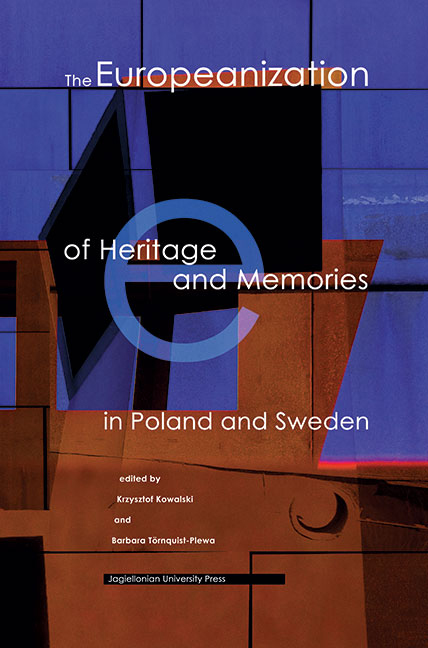Book contents
- Frontmatter
- Contents
- Acknowledgements
- Preface
- PART I European Heritage in the Making
- PART II Redefining the Dramatic Past
- The Europeanization of the Memory and Heritage of the Second World War and the Holocaust in Sweden
- The White Buses. Creating Remembrance of the Second World War in Sweden
- Remembering and Forgetting the Holocaust. The Cases of Jan Karski and Raoul Wallenberg
- The Rise of the Righteous Among the Nations as a New Model for the Polish Hero
- Europeanization at the Memorial Sites of Former Nazi Concentration Camps in Poland. The Cases of Auschwitz, Majdanek and Kulmhof
- Conclusion
- Notes on Contributors
Europeanization at the Memorial Sites of Former Nazi Concentration Camps in Poland. The Cases of Auschwitz, Majdanek and Kulmhof
from PART II - Redefining the Dramatic Past
Published online by Cambridge University Press: 22 December 2017
- Frontmatter
- Contents
- Acknowledgements
- Preface
- PART I European Heritage in the Making
- PART II Redefining the Dramatic Past
- The Europeanization of the Memory and Heritage of the Second World War and the Holocaust in Sweden
- The White Buses. Creating Remembrance of the Second World War in Sweden
- Remembering and Forgetting the Holocaust. The Cases of Jan Karski and Raoul Wallenberg
- The Rise of the Righteous Among the Nations as a New Model for the Polish Hero
- Europeanization at the Memorial Sites of Former Nazi Concentration Camps in Poland. The Cases of Auschwitz, Majdanek and Kulmhof
- Conclusion
- Notes on Contributors
Summary
The European Dream is based on the belief that recent mortal enemies may become neighbors and cooperate closely with each other. As many shocking examples in the last decades have shown, how fast peaceful coexistence between neighbors may turn into mortal hate and murder, the European dream must be understood as a cultural asset of primary importance with eternal relevance.
The question of the ownership of memory and education at former Nazi concentration camp sites has been the subject of a significant number of publications and conferences in Poland in recent years. At the same time, the utmost sensitive nature of these physical and symbolical liéux de mémoire, to use Pierre Nora's concept, is still vividly discussed within Europe and beyond, as the raison d’être of the contemporary museums are the unprecedented mass crimes committed at these sites between 1939−45 by Nazi Germany. Although Poland does not bear the moral responsibility for the mass crimes perpetrated in the German concentration and extermination camps, it still struggles and has to deal with this difficult heritage. Nevertheless, contemporary Poland has adopted a position towards the tangible and intangible heritage of these sites on its contemporary state territory. In this respect, a shift in the perspective has occurred over the last three decades marked by the collapse of Communism in Poland (1989) and its accession to the European Union (2004). According to Aline Sierp, throughout Europe the national framework of commemoration has tended to gradually lose its status as the main reference point and other frameworks (regional, European, global) have gained in importance. The question is therefore if the national memory discourse in Poland is in line with this trend and shows the rising impact of the basic ideas, guidelines and tendencies which accompany the European integration process.
Museums at former concentration and death camp sites are both physical and symbolic places of memories of the darkest period of modern human history. Despite the increasing distance in time, they are gaining in importance as “subjects of a European memory culture” about the Nazi mass murder of the Jews (and to a lesser extent other nations). Dan Diner, according to Aleida Assmann, understands the Holocaust as the “paradigmatic lieu de mémoire” and as a “common point of reference” of the European past.
- Type
- Chapter
- Information
- Publisher: Jagiellonian University PressPrint publication year: 2016



